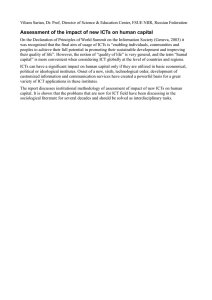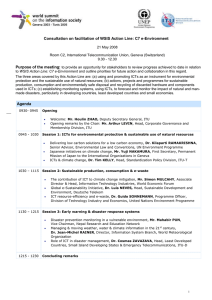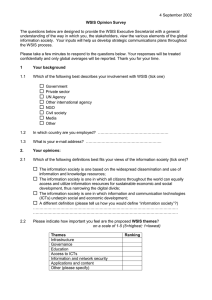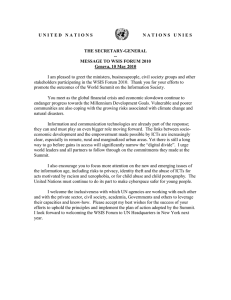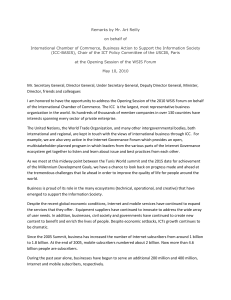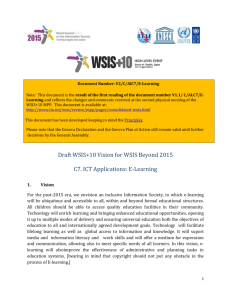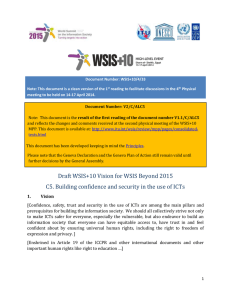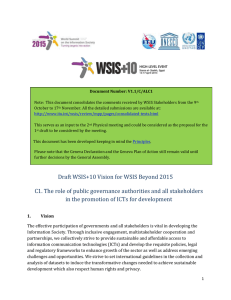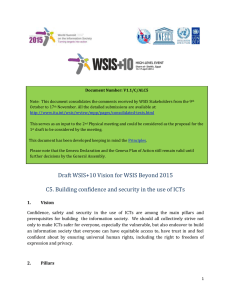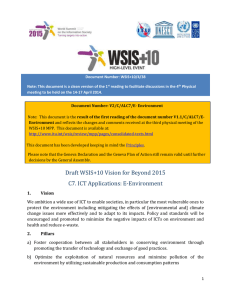WSIS+10 High-Level Event Opening Segment
advertisement
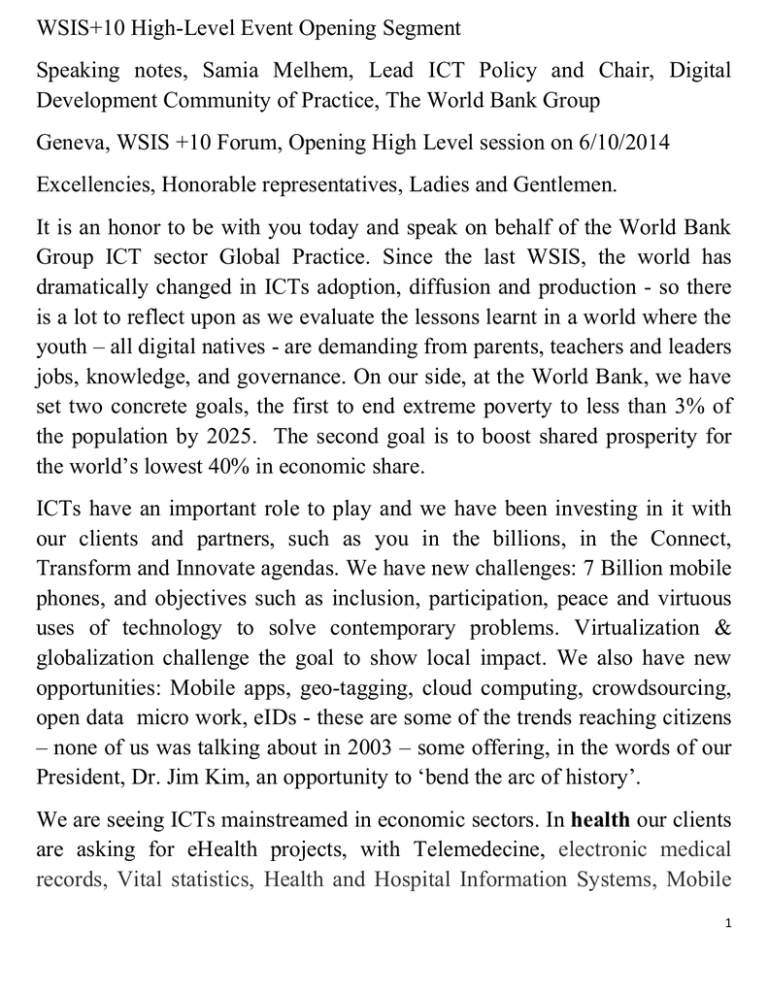
WSIS+10 High-Level Event Opening Segment Speaking notes, Samia Melhem, Lead ICT Policy and Chair, Digital Development Community of Practice, The World Bank Group Geneva, WSIS +10 Forum, Opening High Level session on 6/10/2014 Excellencies, Honorable representatives, Ladies and Gentlemen. It is an honor to be with you today and speak on behalf of the World Bank Group ICT sector Global Practice. Since the last WSIS, the world has dramatically changed in ICTs adoption, diffusion and production - so there is a lot to reflect upon as we evaluate the lessons learnt in a world where the youth – all digital natives - are demanding from parents, teachers and leaders jobs, knowledge, and governance. On our side, at the World Bank, we have set two concrete goals, the first to end extreme poverty to less than 3% of the population by 2025. The second goal is to boost shared prosperity for the world’s lowest 40% in economic share. ICTs have an important role to play and we have been investing in it with our clients and partners, such as you in the billions, in the Connect, Transform and Innovate agendas. We have new challenges: 7 Billion mobile phones, and objectives such as inclusion, participation, peace and virtuous uses of technology to solve contemporary problems. Virtualization & globalization challenge the goal to show local impact. We also have new opportunities: Mobile apps, geo-tagging, cloud computing, crowdsourcing, open data micro work, eIDs - these are some of the trends reaching citizens – none of us was talking about in 2003 – some offering, in the words of our President, Dr. Jim Kim, an opportunity to ‘bend the arc of history’. We are seeing ICTs mainstreamed in economic sectors. In health our clients are asking for eHealth projects, with Telemedecine, electronic medical records, Vital statistics, Health and Hospital Information Systems, Mobile 1 apps for lab tests, appointment management, and access to useful health and nutrition advisory. Introducing ICTs in educational projects has become an important driver for educational reform and for introducing new teaching and learning practices suitable for the 21st century and cross-border R&D. Innovation and Entrepreneurship: Since 2003, we are seeing an increase in community based information systems services, and delivery of information in local language, competitiveness projects to develop the local ICT industries, co-investments in ICT innovation hubs and techno-zones, in partnerships with private sector We are collaborating with clients across the world on Smart Cities projects – bringing together local Governments, Civil Society, Private Sector, using ICTs for transport, urban, energy and public safety services; and collaborating with citizens to improve quality of services delivered, In Financial services, ICTs has allowed innovations in banking, for instance, mobile money has transformed previously unbanked societies. Transferring money is now as easy as sending a text message for migrant workers. Other transformational projects we are financing revolve around digital Identification for social protection, Right to Information Laws and Open Data which are being adopted by many forward thinking countries. We have been supporting several eGovernment projects around the world combining elements of public sector reform, modernization, and ICTs for service delivery improvement. None of this would be possible without affordable accessible Internet. We have been financing national and regional connectivity through PPPs. You heard it from the distinguished speakers before me: We are not there yet, in terms of open access Internet: We need leverage all the private sector 2 partners in well-designed, sustainable PPPs investing in broadband infrastructure, fiber-optic backbones and undersea cables, as well as IXP. We also need to sustain the Internet infrastructure with competent human resources - who can use it and create value and meaningful content for society’s well-being. We need strong, independent regulators. So as we open the summit and reflect on lessons learnt, we want to thank ITU and all partners in helping elevate the agenda for the last ten years. Our 2016 WDR report will be about Economic Impact of Internet. We will be setting up a series of consultation with WSIS partners. If I can leave you with one message: Let’s bring in the economists, anthropologists, sociologists, and human development experts in the discussion. This is not about tech talks, but about smart development. I thank you for your attention, Samia Melhem, Lead ICT Policy Specialist, the World Bank Group 3

